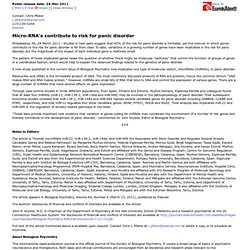

My visit to the brain drug doctor. Today I saw a psychiatrist.

It was an interesting experience. I went to get an assessment for possible OCD based on a genetic predisposition and my poor work-life balance (all work, no life). Can’t sleep? Cooling your brain may be a natural and effective treatment for insomnia. Happiest places have highest suicide rates. Happiness peaks in our eighties. Micro-RNA's contribute to risk for panic disorder. Public release date: 24-Mar-2011 [ Print | E-mail Share ] [ Close Window ] Contact: Chris Pfisterc.pfister@elsevier.com 215-239-3266Elsevier Philadelphia, PA, 24 March 2011 - Studies in twin pairs suggest that 40% of the risk for panic disorder is heritable, yet the manner in which genes contribute to the risk for panic disorder is far from clear.

To date, variations in a growing number of genes have been implicated in the risk for panic disorder, but the magnitude of the impact of each individual gene is relatively small.